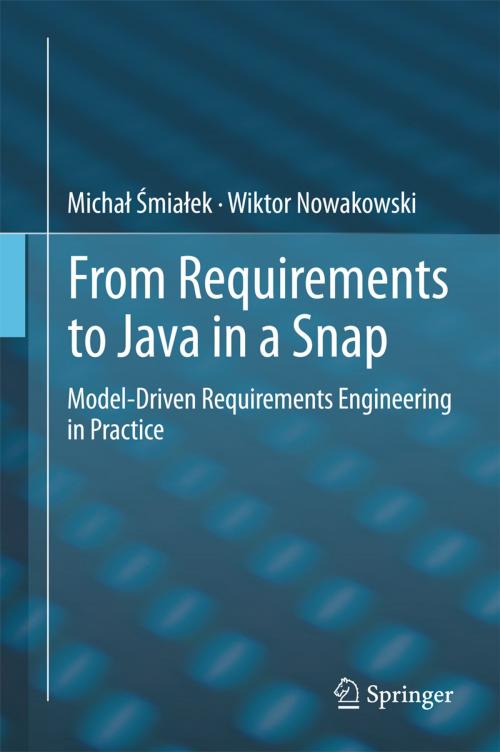From Requirements to Java in a Snap
Model-Driven Requirements Engineering in Practice
Nonfiction, Science & Nature, Mathematics, Logic, Computers, Programming, Software Development, General Computing| Author: | Wiktor Nowakowski, Michał Śmiałek | ISBN: | 9783319128382 |
| Publisher: | Springer International Publishing | Publication: | January 14, 2015 |
| Imprint: | Springer | Language: | English |
| Author: | Wiktor Nowakowski, Michał Śmiałek |
| ISBN: | 9783319128382 |
| Publisher: | Springer International Publishing |
| Publication: | January 14, 2015 |
| Imprint: | Springer |
| Language: | English |
This book provides a coherent methodology for Model-Driven Requirements Engineering which stresses the systematic treatment of requirements within the realm of modelling and model transformations. The underlying basic assumption is that detailed requirements models are used as first-class artefacts playing a direct role in constructing software. To this end, the book presents the Requirements Specification Language (RSL) that allows precision and formality, which eventually permits automation of the process of turning requirements into a working system by applying model transformations and code generation to RSL.
The book is structured in eight chapters. The first two chapters present the main concepts and give an introduction to requirements modelling in RSL. The next two chapters concentrate on presenting RSL in a formal way, suitable for automated processing. Subsequently, chapters 5 and 6 concentrate on model transformations with the emphasis on those involving RSL and UML. Finally, chapters 7 and 8 provide a summary in the form of a systematic methodology with a comprehensive case study.
Presenting technical details of requirements modelling and model transformations for requirements, this book is of interest to researchers, graduate students and advanced practitioners from industry. While researchers will benefit from the latest results and possible research directions in MDRE, students and practitioners can exploit the presented information and practical techniques in several areas, including requirements engineering, architectural design, software language construction and model transformation. Together with a tool suite available online, the book supplies the reader with what it promises: the means to get from requirements to code “in a snap”.
This book provides a coherent methodology for Model-Driven Requirements Engineering which stresses the systematic treatment of requirements within the realm of modelling and model transformations. The underlying basic assumption is that detailed requirements models are used as first-class artefacts playing a direct role in constructing software. To this end, the book presents the Requirements Specification Language (RSL) that allows precision and formality, which eventually permits automation of the process of turning requirements into a working system by applying model transformations and code generation to RSL.
The book is structured in eight chapters. The first two chapters present the main concepts and give an introduction to requirements modelling in RSL. The next two chapters concentrate on presenting RSL in a formal way, suitable for automated processing. Subsequently, chapters 5 and 6 concentrate on model transformations with the emphasis on those involving RSL and UML. Finally, chapters 7 and 8 provide a summary in the form of a systematic methodology with a comprehensive case study.
Presenting technical details of requirements modelling and model transformations for requirements, this book is of interest to researchers, graduate students and advanced practitioners from industry. While researchers will benefit from the latest results and possible research directions in MDRE, students and practitioners can exploit the presented information and practical techniques in several areas, including requirements engineering, architectural design, software language construction and model transformation. Together with a tool suite available online, the book supplies the reader with what it promises: the means to get from requirements to code “in a snap”.















